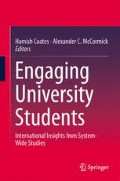Abstract
This discussion of the South African Survey of Student Engagement (SASSE) begins by examining the South African higher education landscape and post-apartheid challenges. It is argued that student engagement data and research can be used to improve the quality of teaching and learning, especially for undergraduates, and to create conditions that are more conducive to student success. The discussion turns to the development of a suite of South African institutional-level measures for students, lecturers, beginning students as well as class-level measures. Broad trends in the results are summarised, and the chapter concludes with discussion of applications of the survey data for quality improvement, research and capacity development.
Access this chapter
Tax calculation will be finalised at checkout
Purchases are for personal use only
Notes
- 1.
A person of racially mixed parentage or descent.
References
Badsha, N., & Cloete, N. (2011). Higher education: Contribution for the NPC’s national development plan. Wynberg: Centre for Higher Education Transformation (CHET) (www.chet.org.za/files/uploads/reports/HE%20Contribution%20to%20NPCs%20National%20Development%20Plan.pdf).
Cloete, N. (2011). University world news—South Africa: Radical new plan for higher education. www.universityworldnews.com/article.php?story=2011120222252975. Accessed 12 Dec 2011.
Council on Higher Education (CHE). (2004). South African higher education in the first decade of democracy. Pretoria: Council on Higher Education (www.che.ac.za/documents/d000081/).
Council on Higher Education (CHE). (2009). The state of higher education in South Africa (Higher Education Monitor No. 8). Pretoria: Council on Higher Education (www.che.ac.za/documents/d000201/Higher_Education_Monitor_8.pdf).
Jansen, J. D., Herman, C., Matentjie, R. M., Pillay, V., Sehoole, C., & Weber, E. (2007). Tracing and explaining change in higher education: The South African case. In Council on Higher Education (Ed.), Review of higher education in South Africa: Selected themes (pp. 157–195). Pretoria: Council on Higher Education.
Kinzie, J. (2011). Using student engagement results to assess & improve educational quality. Bloomington: Centre for Post Secondary Research (cpr.iub.edu/uploads/NSSE%20HLC%20Showcase%20session%202011.pdf).
Kinzie, J., & Pennipede, B. S. (2009). Converting engagement results into action. New Directions for Institutional Research, 141, 83–96. doi: 10.1002/ir.28.
Lange, L. (Winter 2006). Symbolic policy and “performativity”: South African higher education between the devil and the deep blue sea. In Council on Higher Education (Ed.), Kagisano: Ten years of higher education under democracy (Issue 4, pp. 39–53). Pretoria: Council on Higher Education (www.che.ac.za/documents/d000128/).
Letseka, M., & Maile, S. (March 2008). High university drop-out rates, a threat to South Africa’s future: HSRC Policy Brief. www.hsrc.ac.za/Document-2717.phtml. Access 11 March 2012.
MacGregor, K. (28 Oct 2007). Student drop-out rates alarming. University World News. www.universityworldnews.com/article.php?story=20071025102245380. Access 11 March 2012.
Materu, P. (2007). Higher education quality assurance in Sub-Saharan Africa: Status, challenges, opportunities, and promising practices (World Bank Working Paper No. 124). Washington, DC: The World Bank (doi:10.1596/978-0-8213-7272-2).
McCormick, A. C. (Spring 2009). Toward reflective accountability: Using NSSE for accountability and transparency. New Directions for Institutional Research, 2009(141), 97–106.
National Planning Commission (NPC). (2011). National development plan: Vision for 2030. Pretoria: National Planning Commission (www.npconline.co.za/medialib/downloads/home/NPC%20National%20Development%20Plan%20Vision%202030%20-lo-res.pdf).
Organisation for Economic Co-operation and Development (OECD). (2008). Reviews of National Policies for Education: South Africa. Paris: OECD (http://digm.meb.gov.tr/uaorgutler/OECD/5.Reviews%20of%20National%20Policies%20for%20Education%20South%20Africa.pdf).
Scott, I. (2009). First-year experience as terrain of failure or platform for development? Critical choices for higher education. In B. Leibowitz, A. van der Merwe, & S. van Schalkwyk (Eds.), Focus on first-year success: Perspectives emerging from South Africa and beyond (pp. 17–37). Stellenbosch: African Sun Media.
Scott, I., Yeld, N., & Hendry, J. (2007). A case for improving teaching and learning in South African higher education (Higher Education Monitor No. 6). Pretoria: Council on Higher Education.
Strydom, J. F., & Basson, N. (2010). CHE-UFS student engagement research project (Report for the Council on Higher Education). Bloemfontein: University of the Free State.
Strydom, J. F., & Mentz, M. (2009). Quality, effectiveness and cohesion: Starting a conversation (Report for the Council on Higher Education). Bloemfontein: University of the Free State.
Strydom, J. F., Kuh, G. D., & Mentz, M. (2010). Enhancing success in South Africa’s higher education: Measuring student engagement. Acta Academica, 42(1), 259–278 (ISSN 0587-2405).
Trow, M. (2005). Reflections on the transition from elite to mass to universal access: Forms and phases of higher education in modern societies since WWII. In P. Altbach (Ed.), International handbook of higher education. Dordrecht: Kluwer Academic.
World Economic Forum (2009). The global competitiveness report 2009–2010. Geneva: World Economic Forum.
Author information
Authors and Affiliations
Corresponding author
Editor information
Editors and Affiliations
Rights and permissions
Copyright information
© 2014 Springer Science+Business Media Singapore
About this chapter
Cite this chapter
Strydom, J., Mentz, M. (2014). Student Engagement in South Africa: A Key to Success, Quality and Development. In: Coates, H., McCormick, A. (eds) Engaging University Students. Springer, Singapore. https://doi.org/10.1007/978-981-4585-63-7_6
Download citation
DOI: https://doi.org/10.1007/978-981-4585-63-7_6
Published:
Publisher Name: Springer, Singapore
Print ISBN: 978-981-4585-62-0
Online ISBN: 978-981-4585-63-7
eBook Packages: Humanities, Social Sciences and LawEducation (R0)

